10 Best Python Courses for 2024: Charming the Snake
A curated guide to the most comprehensive, cost-effective, and beginner-friendly Python courses, complete with coding exercises and practical projects.
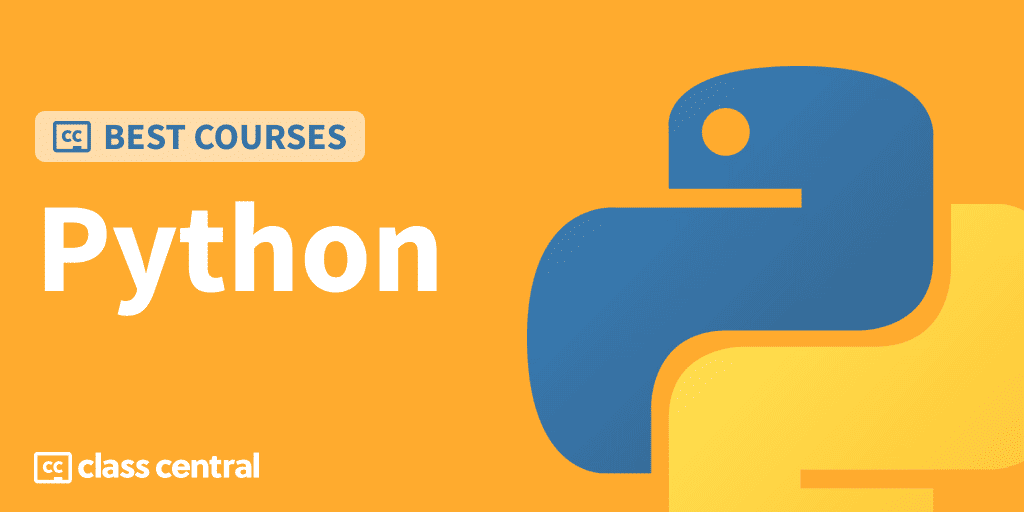
Python continues to dominate the programming world, making it a top choice for newcomers. And thanks to its popularity, there are tons of learning resources for it out there. Sounds great, right?
Well, if you’ve tried researching for Python resources, you’ll know that there are far too many 💩 and 💸 courses out there. It’s easy to feel swamped when looking for the best course to embark on your Python journey.
Fortunately for you, I’ve taken the time to sift through the maze of courses available so you don’t have to.
In this Best Courses Guide, you’ll discover the cream of the crop when it comes to online Python courses. I’ve focused on courses that are comprehensive with lots of coding exercises to practice, and to my surprise there’s quite a few hidden gems in this collection. Not only are the majority of them free or free-to-audit, three of them even offer free certificates upon completion. That’s right, you can get top-notch education without the hefty price tag while receiving a certificate as proof of your accomplishments. How awesome is that?
Python’s versatility stretches across various domains, from web development and data analysis to artificial intelligence and scientific computing. Keeping this in mind, I’ve curated a mix of courses to cater to diverse interests, whether they’re offered by prestigious universities, innovative open-source projects, or passionate individuals eager to share their expertise. Dive in and find the course that fits your aspirations perfectly!
| Course Highlight | Workload |
| Best University-Level Text-Based Course with Free Certificate (Helsinki) | 140 + 140 hours |
| Best University-Level Video-Based Course with Free Certificate (Harvard) | 30–90 hours |
| Best Free Web Development Course for Absolute Beginners (Michigan) | 28 hours |
| Best Free IoT Course to Get PCAP™ Certified with Free Certificate (Cisco) | 35 + 40 hours |
| Best Free Scientific Computing Course (freeCodeCamp) | N/A |
| Best Free Interactive Course for Absolute Beginners (FutureCoder) | N/A |
| Best Free Computer Science and Programming Course (MIT) | 144 hours |
| Best Data Science Course for Beginners (AI Sciences) | 12 hours |
| Best Project-Based Course (Angela Yu) | 58 hours |
| Best For Automating Your Digital Life (Al Sweigart) | 10 hours |
What is Python?
In the ever-evolving landscape of programming, some languages come and go, while others, like Python, solidify their place in the pantheon of coding giants.
Python is a high-level, general-purpose programming language lauded for its simplicity. Created by Guido van Rossum in the late 1980s, Python was built with readability at its core, which not only speeds up the development process but also makes it an excellent entry point for beginners. That is why it is the most taught introductory language in U.S. universities, as well as being a very popular language among scientists and academics.
Python’s versatility is evident in its wide range of applications, from web development using frameworks like Django and Flask, to scientific computing with tools like SciPy and NumPy, and even video games with PyGame. A testament to its popularity is its ranking on the TIOBE index, where it currently tops the leaderboard. Similarly, on GitHub, a hub for coders to collaborate, Python proudly holds the second spot in usage. Not to be left behind, the 2023 Stack Overflow survey places Python as the third most favored language, following closely behind JavaScript and HTML/CSS.
Especially in the spheres of machine learning and data analysis, Python stands out. Various surveys have indicated a majority — a staggering 70% of professionals — lean towards Python, largely thanks to robust libraries like TensorFlow, Keras, and Pandas. Coincidentally, according to the World Economic Forum’s Future of Jobs Report, the demand for machine learning and data science specialists will be growing faster than for any other field through 2025.
Course Ranking Statistics
Here are some aggregate stats about the ranking:
- Eight courses are entirely free or free-to-audit. Two are paid.
- Three of the courses offer free certifications.
- All except two courses are beginner-friendly.
- Every course in this ranking uses Python 3.
Without further ado, let’s go through the top picks.
Best University-Level Text-Based Course with Free Certificate (University of Helsinki)
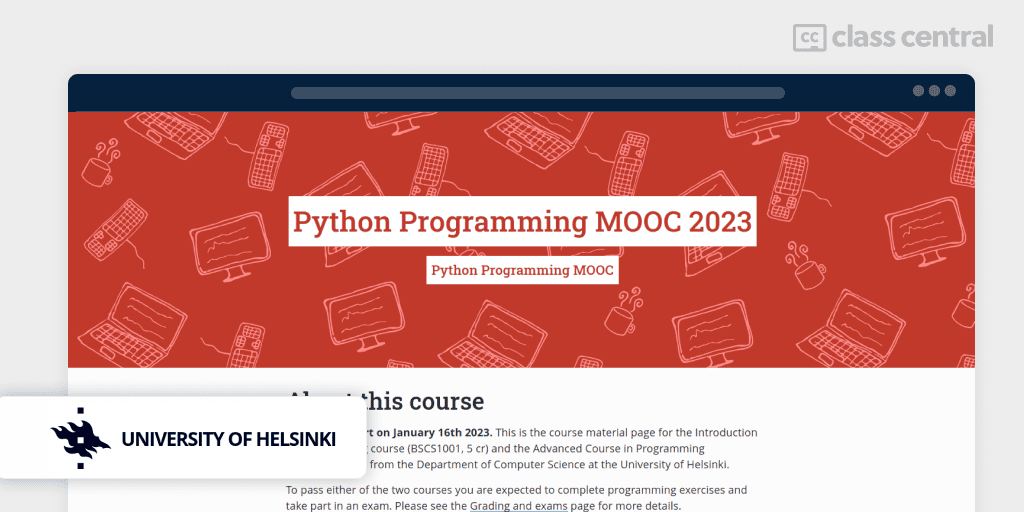
If you’re an avid reader of my BCGs (thank you :D), you might suspect my love for Helsinki’s MOOCs. And Python Programming MOOC 2023 is no exception.
What makes this Helsinki course so great from the rest of the crowd?
- Completely free to enroll, with access to all of the course content. Nothing of the usual limited free-trial / free-to-audit hanky panky.
- Accessible to anyone and everyone, no prior programming experience needed.
- Incredibly comprehensive and easy-to-understand lessons with optional video lectures.
- Over 250+ well-designed coding exercises and quizzes with instant feedback and automatic grading. Hands-on experience is absolutely crucial when starting out. You’ll start doing exercises in the browser before moving over to Visual Studio Code, a popular code editor, once you have enough experience. Every exercise has a model solution for you to compare your answers with.
- Official community support channel on Discord.
- And best part of all, after completing the exams (dates here), you can get a certificate of completion for free!*
After reading all of that, you better be as excited about the course as I am. In fact, I’m quite jealous as the materials here are better than what my university taught.
Now, let me get to the content of the course. This course is actually made up of two courses: Introduction to Programming and Advanced Course in Programming. Upon completion of both courses, you’ll be able to write programs and understand how they work, including the topics like algorithms, control structures, subprograms, and object-oriented programming. And you’ll prove this by creating a fully-fledged video game that’ll be peer reviewed by fellow learners.
*If you wish to have the course completion and the ECTS credits entered in the University of Helsinki’s student records, enroll through the Open University once you have completed the course.
| Institution | University of Helsinki |
| Level | Beginner to Advanced |
| Workload (in ECTS) | 140 + 140 hours |
| Cost | Free |
| Exercises | Available, graded exercises and exams |
| Certificate | Free |
Best University-Level Video-Based Course with Free Certificate (Harvard University)
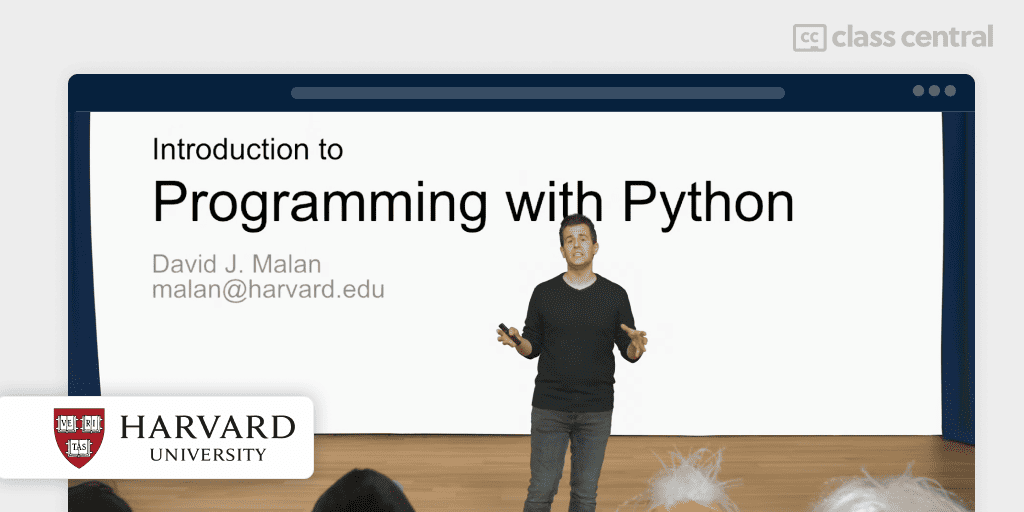
A strong contender to Helsinki’s course is Harvard’s CS50x course, Introduction to Programming with Python. Not only does it match the comprehensive content and thorough assessments of Helsinki’s offering, but it also takes a leap forward in its impeccable production value.
With the course drawing in references from contemporary pop culture for its examples and exercises, along with the instructor, David Malan, himself being an excellent presenter to listen to, you’ll find that the lectures in this course are strangely addictive!
Another bonus? There’s no need for additional software installations. You’ll be able to dive into coding using an in-browser version of VSCode, customized specifically for the CS50 experience.
And the cherry on top: Unlike the majority of edX courses, the entirety of the CS50 courses is accessible for free. That means unhindered access to all resources, including the auto-graded exercises, notes, projects, etc. And to showcase your accomplishment, you can secure a free but unverified certificate or opt for a verified one for a nominal fee. See this link for more information.
Thus if you rather much prefer learning from video lectures rather than reading blocks of text, CS50x is right for you.
| Institution | Harvard University |
| Provider | edX |
| Instructor | David J. Malan |
| Level | Beginner |
| Workload | 30–90 hours |
| Enrollments | 614K |
| Cost | Free |
| Exercises | Available, graded exercises and final project |
| Certificate | Free (unverified) or Paid (verified) |
Best Free Web Development Course for Absolute Beginners (University of Michigan)

Any Python course guide can’t really be considered complete if it doesn’t have Dr. Chuck’s course, can it?
Programming for Everybody (or Python for Everybody) is an excellent course meant for absolute beginners. And I really mean it when I say absolute beginners. Whereas other beginner courses might skip over some introductory stuff for the sake of brevity and that “it’s intuitive to understand”, this course doesn’t. Dr. Chuck explains how computers and programming work in a very friendly and understandable way, to the point where you’ll never get bored listening to him! So I really recommend this course for anyone who finds the abstractness of programming scary.
Now, just because this course is for absolute beginners doesn’t mean that the things it teaches are absolutely basic — far from it. It delves into everything you need to know about Python in order to create web applications, including object-oriented programming, a way to represent code like real-world objects. It discusses how data is passed from your PC to a server, explains web protocols like HTTP or APIs like JSON, as well as databases that can store huge amounts of data. And if you’re paying for the course, you’ll also work on not-so-trivial projects throughout this course, such as a search engine or visualizing email data. Don’t worry if you’re not though, you won’t be missing out on hands-on experience, for you’ll find many quizzes and exercises to complete.
Since this course is super duper popular, there are multiple ways to take this course: book or video form. The book the course is based on has been translated into many different languages and formats, but the book I recommend you follow along is the interactive one.
If you want to learn by watching videos, you can choose from the following: Coursera, edX, YouTube, or his website. The first three offer a paid certificate. Otherwise if you don’t want to pay a dime for the course, go for the website as not only is it completely free, but it also offers an equivalent learning experience to the other course providers I’ve mentioned, such as a grade book, auto-graded assignments, peer-graded exercises, discussion forums, and even free badges.
| Institution | University of Michigan |
| Provider | Coursera |
| Instructor | Charles Severance |
| Level | Beginner |
| Workload | 28 hours |
| Enrollments | 2.9M |
| Rating (Coursera) | 4.8 / 5.0 (205K) |
| Cost | Free-to-Audit / Free |
| Exercises | Available, graded exercises |
| Certificate | Paid |
Best Free IoT Course to Get PCAP™ Certified with Free Certificate (Cisco Networking Academy)
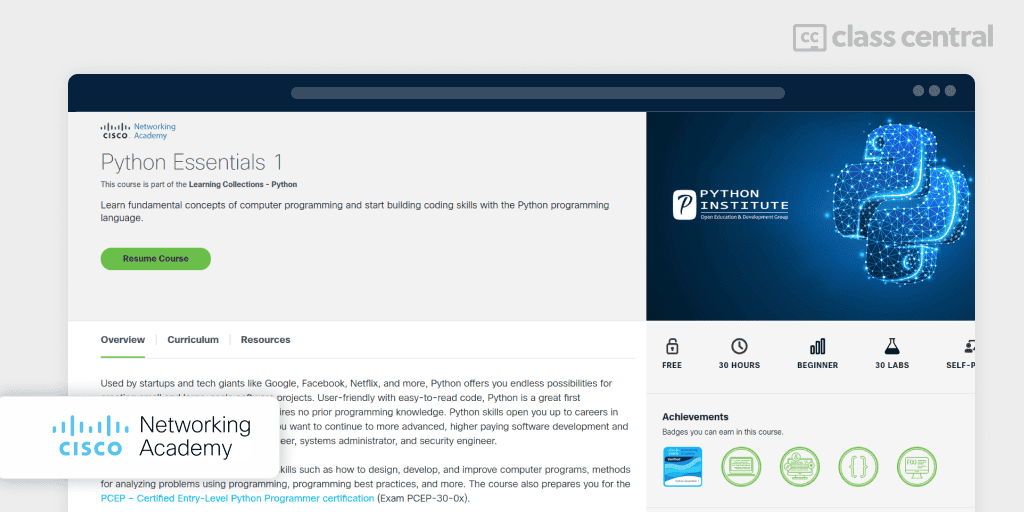
PCAP: Programming Essentials in Python, designed and developed by the OpenEDG Python Institute in partnership with the Cisco Networking Academy, takes you from zero to certification-ready.
It prepares you for the PCAP™ – Certified Associate in Python Programming Exam, which tests your ability to perform intermediate-level coding tasks. Though the exam is paid, it’ll be discounted by half upon completion of both courses, which is quite nice. But what’s even nicer is that you’ll get a certificate of completion for free anyways, though it isn’t the same as a PCAP™ certification.
This course is split into two parts: Python Essentials 1 and Python Essentials 2.
Python Essentials 1 covers everything you need to know to start designing, writing, running, debugging, and improving Python programs at the foundational level, whereas Python Essentials 2 takes you even further with advanced topics such as I/O, exception handling, and object-oriented programming.
As for how you’ll learn, the course is presented in a text-based format filled with illustrations and interactive code examples. There are quizzes after every section and tests after every module. Not only that, you’ll also work on the in-browser programming labs to fully consolidate what you’ve learned. So this course is really great for hands-on learning too!
By the way, this course has also been translated to Spanish.
| Institution | Cisco Networking Academy |
| Level | Intermediate |
| Workload | 35 + 40 hours |
| Cost | Free |
| Exercises | Available, labs, quizzes, assessments, and tests |
| Certificate | Free certificates and badges |
Best Free Scientific Computing Course (freeCodeCamp)
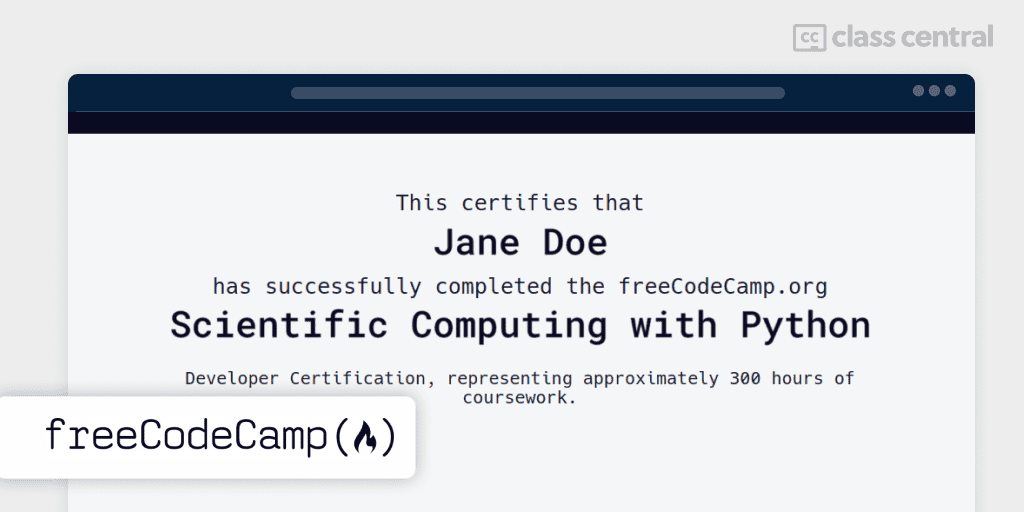
I did say that there are many ways to take Programming for Everybody, so don’t be surprised that this freeCodeCamp course I’m recommending is also a variation of it. I’ll explain why I’ve made this a separate course soon, I promise!
Scientific Computing with Python is a free course with the same video lectures and content as Programming for Everybody, but with additional content. It contains additional quizzes to test your retention of the concepts after each lecture, yes, but what’s even better is that you can get a free certificate of completion, unlike the aforementioned courses.
How do you complete the course? You’ll need to finish five unique capstone projects that culminate what you’ve learned so far, all of which are automatically graded on submission. Thus, you can also take this course for the certificate if you have done the Programming for Everybody courses, without any repetition of content. And that’s why I’ve separated this course in this BCG.
What are the projects you’ll need to complete? I’ll briefly describe them below for convenience:
- Arithmetic Formatter: Format and align arithmetic expressions vertically, just the way you would if you were doing the calculations by hand.
- Time Calculator: A calculator that takes in a time and weekday, adds a particular duration to it (say 14 hours), and finally returns the new calculated time and day.
- Budget App: Create a command-line interface (CLI) app to help you keep track of your expenses by visualizing them with a graph.
- Polygon Area Calculator: Learn OOP by creating rectangle and square classes smart enough to know their properties.
- Probability Calculator: Determine the probability of drawing balls of certain colors randomly from a hat.
| Provider | freeCodeCamp |
| Instructor | Charles Severance |
| Level | Beginner |
| Workload | N/A |
| Cost | Free |
| Exercises | Yes, quizzes and graded projects |
| Certificate | Free |
Best Free Interactive Course for Absolute Beginners (FutureCoder)
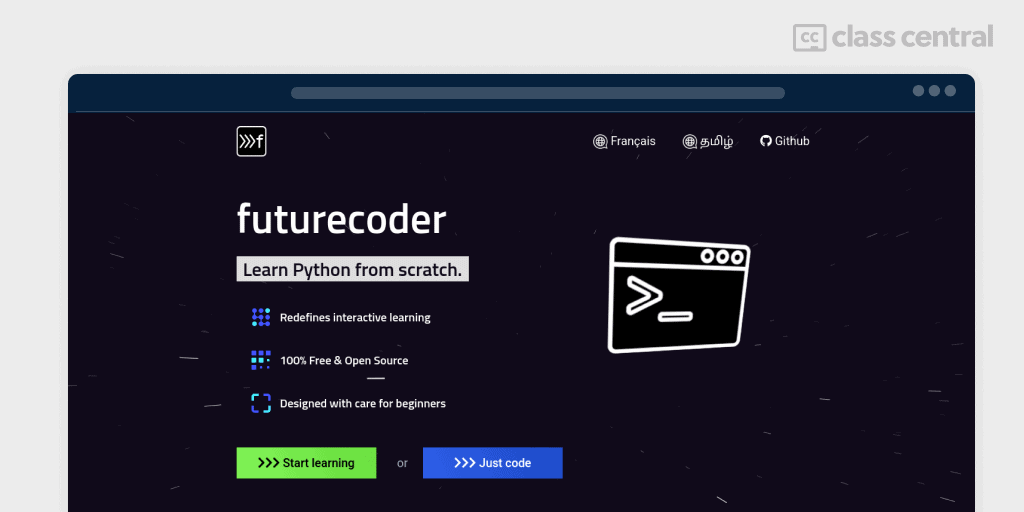
FutureCoder is a 100% free and interactive open-source course for complete beginners to teach themselves programming. Also available in French, Tamil, and Spanish, you’ll learn enough of the most common programming concepts to code a complete game of TicTacToe, through hands-on exercises.
What makes this interactive course different from others?
Firstly, it’s using a recent version of Python (version 3.10). It’s also fully text-based. That means you don’t need to sit through an hour-long lecture before being able to write a single line of code — you’ll learn by coding and code by learning. An in-browser programming environment will be provided, and all answers submitted will be automatically graded.
But what if your code fails to execute, or even worse, it executes but the answer you get is completely different from what you expect? Indeed, these two problems often cause beginners to give up on programming altogether, thinking that they’re not cut out for it. Not to worry! FutureCoder eases these beginner frustrations by giving you easily understandable error messages as well as tools to step into your code and see what it’s really doing behind the scenes, otherwise known as debugging.
Thus, if you’re looking for a quick and easy way to get invested into the world of programming, I highly recommend this course.
| Provider | FutureCoder |
| Level | Beginners |
| Workload | N/A |
| Cost | Free |
| Exercises | Available, graded interactive exercises |
| Certificate | None |
Best Free Computer Science and Programming Course (Massachusetts Institute of Technology)
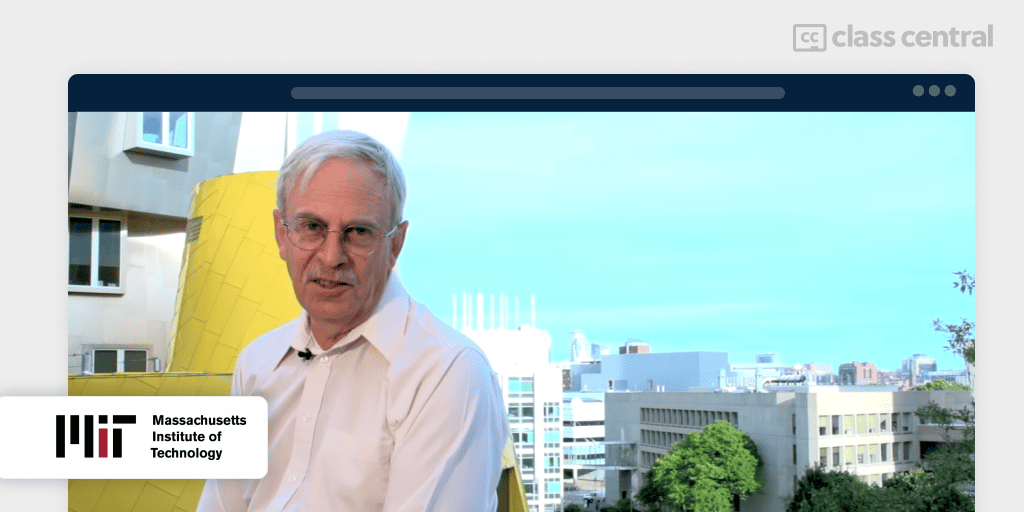
Most of the courses in this BCG mainly teach you how to program in Python, without going deep into the details on how code is actually executed by the computer. Though you don’t actually need to know what’s going on inside your PC to be a good programmer, it certainly does help you become one.
How? You’ll better understand why your code may be slow or error-prone, and quickly come up with alternatives thanks to mathematical rigorousness.
Thus, if you’re willing to invest some time (and brain power) studying programming and computer science the hard way, what better course is there than MIT’s free-to-audit course?
Introduction to Computer Science and Programming Using Python will provide you with a brief introduction to a variety of topics in computer science (algorithms, data structures, recursion, etc.), with more focus on breadth than depth, while also implementing them in Python! Thus by the end of this course, you’ll know what problems computer science can solve in your programming endeavors.
If you’re paying for the certificate, you’ll have to complete 3 problem sets, as well as a midterm exam and a final exam.
As expected from an MIT course, this course is challenging and comprehensive. You should be willing to stomach some math (and remember the algebra you learned in high school as well), for this course doesn’t shy away from that.
| Institution | Massachusetts Institute of Technology |
| Provider | edX |
| Instructor | John Guttag, Eric Grimson, Ana Bell |
| Level | Intermediate |
| Workload | 144 hours |
| Enrollments | 1.6M |
| Rating | 4.8 / 5.0 (155) |
| Cost | Free-to-Audit |
| Exercises | Available, exercises, problem sets, and exams |
| Certificate | Paid |
Best Data Science Course for Beginners (AI Sciences)
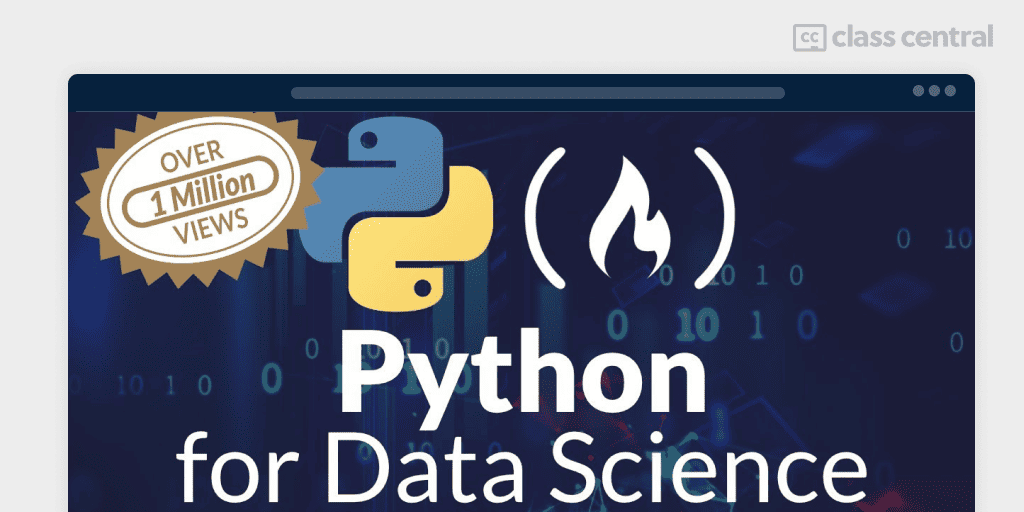
So you’ve jumped onto the Data Science hype train, have ya? Then welcome aboard! Data Science is still extremely lucrative in this fast-paced world of tech.
But what if you want to do data science but have no knowledge of Python or even programming yet? Well, AI Sciences’s free course has got you covered.
This free course is one of the best ways to get started with Python and Data Science. First, you’ll understand what programming is and how you can think like a programmer. Then, you’ll go through the fundamentals of Python one by one, placing great importance on applying it to data analysis. And once you’ve grasped the basics, you’ll be given a not-so-simplistics overview of the tools and techniques used in Data Science! You’ll also get used to one of the most popular tools among data scientists, Jupyter notebooks, and also Python libraries, like Matplotlib for plotting data, and pandas and NumPy for numerical computing and analysis.
| Channel | freeCodeCamp |
| Provider | YouTube |
| Instructor | AI Sciences |
| Level | Beginner |
| Workload | 12 hours |
| Views | 3.2M |
| Likes | 74K |
| Cost | Free |
| Exercises | None, but Jupyter Notebooks available |
| Certificate | None |
Best Project-Based Course (Angela Yu)
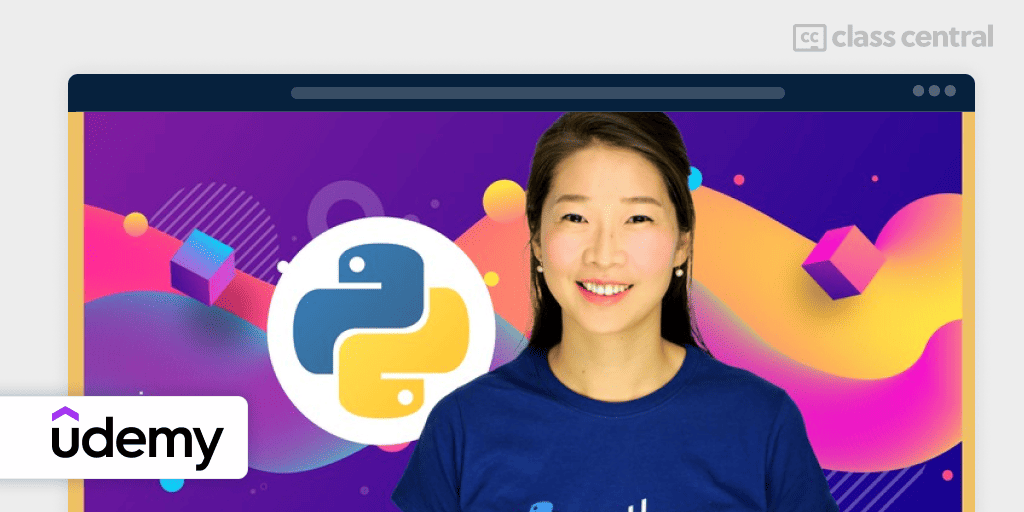
The last two courses in this BCG may be paid, but they are extremely popular with lots of fan testimonials!
And the first course I’ll introduce to you is Angela Yu’s 100 Days of Code, with almost 1 million enrollments. As the name suggests, the course spans 100 days. Each day, you’ll spend an hour building a project. By the time you finish the course, you’ll have a hundred projects to put into your portfolio!
In terms of content, this course is no slouch. It covers all the bases of programming and software development. From the fundamentals of Python, to making a website with Flask and Django, to analyzing data to make future predictions and even doing a touch of machine learning, Angela Yu ensures that you get a well-rounded education. The course also delves into practical applications and real-world scenarios, making it highly relevant for anyone aiming to dive into the tech industry.
Thus if you’re someone who doesn’t have a lot of time on their hands, perhaps hoping to get into tech but not yet sure what to specialize in, Angela Yu’s course will expand your horizons.
| Provider | Udemy |
| Instructor | Angela Yu |
| Level | Beginner |
| Workload | 58–100 hours |
| Enrollments | 990K |
| Rating | 4.7 / 5.0 (224K) |
| Cost | Paid |
| Exercises | Available, projects |
| Certificate | Paid |
Best For Automating Your Digital Life (Al Sweigart)
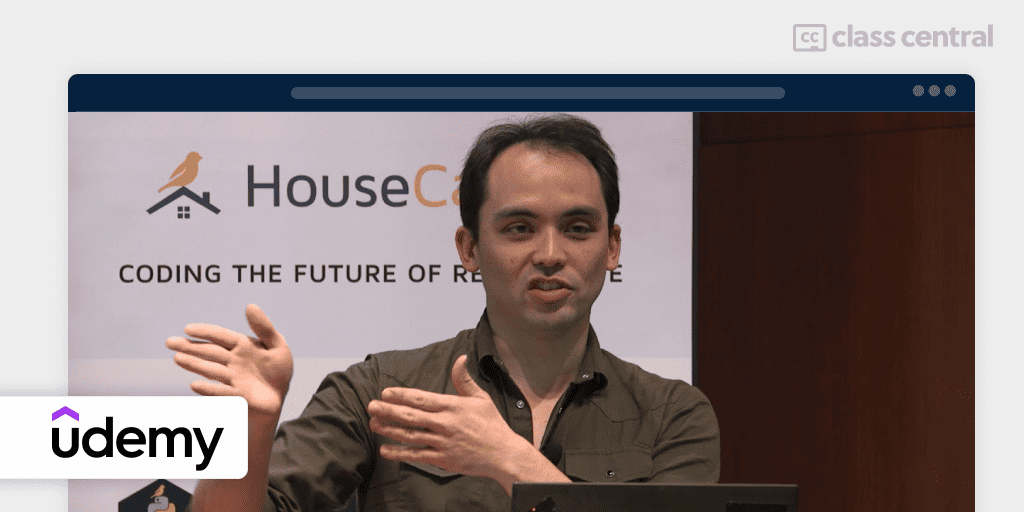
Just like Angela Yu’s, Al Sweigart’s paid course is the other Udemy course you’ll find that people swear by, with an astounding 1.1 million enrollments.
Automate the Boring Stuff with Python Programming, based on the free online book of the same name, quickly teaches you enough Python to be put into practical use. It does this by skipping all the technical computer sciency stuff and instead jumps straight to the juicy parts of programming — how to make your life and work less tedious.
Ever need to spend a few minutes everyday to check a website for updates? Or perhaps your colleagues pass you reports that you need to spend hours going through before presenting them to your boss in an Excel spreadsheet? Or heck, you have to transcribe text in an image by hand?
All these tedious time-consuming tasks, from sending emails, controlling your mouse and keyboard, and more can be easily automated in this course.
Just to let you know, Al gives away free Udemy coupons to his course every year (on his Reddit account). Keep a look out for them and hope you’re lucky enough to snag one!
| Provider | Udemy |
| Instructor | Al Sweigart |
| Level | Beginner |
| Workload | 10 hours |
| Enrollments | 1.1M |
| Rating | 4.6 / 5.0 (109K) |
| Cost | Paid |
| Exercises | Available, quizzes and demos |
| Certificate | Paid |
Best Courses Guides Methodology
I built this ranking following the now tried-and-tested methodology used in previous Best Courses Guides (you can find them all here). It involves a three-step process:
- Research: I started by leveraging Class Central’s database with 150K online courses and 200K+ reviews. Then, I made a preliminary selection of over 3,500 Python courses by rating, reviews, and bookmarks.
- Evaluate: I read through reviews on Class Central, Reddit, and course providers to understand what other learners thought about each course and combined it with my own experience as a learner.
- Select: Well-made courses were picked if they presented valuable and engaging content and they have to fit in a set of criteria and be ranked accordingly: comprehensive curriculum, affordability, release date, ratings and enrollments.






